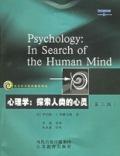
这才是心理学》第1版出版于1983年,20多年来一直被奉为心理学入门经典,在全球顶尖大学中享有盛誉,现在呈现在读者面前的是英文第9版。这本《这才是心理学(第9版·英文版)》并不同于一般的心理学导论类教材,很多内容是心理学课堂上不曾讲授的,也是许多心理学教师在教学中感到只可意会而不可言传的。作者正是从此初衷出发,以幽默生动的语言,结合一些妙趣横生、贴近生活的实例,深入浅出地介绍了可证伪性、操作主义、实证主义、安慰剂效应、相关和因果、概率推理等心理学中的基本原则。与上一版相比,第9版更新了最新的研究资料和实例以及190篇参考文献。
这才是心理学(第9版)(英文版)
作者:基思·斯坦诺维奇
出版:人民邮电出版社 2014-7
平装:16开:240页
版次:第9版
ISBN:9787115353375
定价:48.00
内容简介
在今天的大众媒体和图书市场上,到处充斥着关于潜能提升、心理操控、色彩星座、催眠读心等伪装成心理学的主题,更有一些伪心理学家、所谓的心理治疗师打着心理学的旗号欺世盗名,从中渔利。在浩如烟海、良莠不齐的心理学信息面前,如何拨除迷雾,去伪存真,成为一个明智的心理学信息的消费者?这本《这才是心理学(第9版·英文版)》将教给你科学实用的批判性思维技能,将真正的心理学研究从伪心理学中区分出来,告诉你什么才是真正的心理学。
《这才是心理学》第1版出版于1983年,20多年来一直被奉为心理学入门经典,在全球顶尖大学中享有盛誉,现在呈现在读者面前的是英文第9版。这本《这才是心理学(第9版·英文版)》并不同于一般的心理学导论类教材,很多内容是心理学课堂上不曾讲授的,也是许多心理学教师在教学中感到只可意会而不可言传的。作者正是从此初衷出发,以幽默生动的语言,结合一些妙趣横生、贴近生活的实例,深入浅出地介绍了可证伪性、操作主义、实证主义、安慰剂效应、相关和因果、概率推理等心理学中的基本原则。与上一版相比,第9版更新了最新的研究资料和实例以及190篇参考文献。
《这才是心理学(第9版·英文版)》不仅适合于心理学专业的学生,有助于建立心理学研究中必要的批判性思维技能与意识,而其通俗易读性也非常适合所有对心理学感兴趣的读者,它将帮助你纠正对心理学的种种误解,学会独立地评估心理学信息,用科学的精神和方法理解自己和他人的行为。此外,由于心理学与其他学科的共通性,《这才是心理学(第9版·英文版)》也不失为一本精彩有趣的科学哲学类读物。
目录
Preface xi
1 Psychology Is Alive and Well (and Doing Fine Among the Sciences) 1
The Freud Problem 1
The Diversity of Modern Psychology 2
Implications of Diversity 3
Unity in Science 6
What, Then, Is Science? 8
Systematic Empiricism 9
Publicly Verifiable Knowledge: Replication and Peer Review 10
Empirically Solvable Problems: Scientists' Search for Testable Theories 12
Psychology and Folk Wisdom: The Problem with “Common Sense” 13
Psychology as a Young Science 16
Summary 18
2 Falsifiability: How to Foil Little Green Men in the Head 19
Theories and the Falsifiability Criterion 20
The Theory of Knocking Rhythms 22
Freud and Falsifiability 23
The Little Green Men 25
Not All Confirmations Are Equal 26
Falsifiability and Folk Wisdom 27
The Freedom to Admit a Mistake 28
Thoughts Are Cheap 30
Errors in Science: Getting Closer to the Truth 31
Summary 34
3 Operationism and Essentialism: “But, Doctor,What Does It Really Mean?” 35
Why Scientists Are Not Essentialists 35
Essentialists Like to Argue About the Meaning of Words 36
Operationists Link Concepts to Observable Events 37
Reliability and Validity 38
Direct and Indirect Operational Definitions 40
Scientific Concepts Evolve 40
Operational Definitions in Psychology 42
Operationism as a Humanizing Force 45
Essentialist Questions and the Misunderstanding of Psychology 47
Operationism and the Phrasing of Psychological Questions 48
Summary 51
4 Testimonials and Case Study Evidence:Placebo Effects and the Amazing Randi 53
The Place of the Case Study 54
Why Testimonials Are Worthless: Placebo Effects 56
The “Vividness” Problem 59
The Overwhelming Impact of the Single Case 63
The Amazing Randi: Fighting Fire with Fire 65
Testimonials Open the Door to Pseudoscience 67
Summary 71
5 Correlation and Causation: Birth Control by the Toaster Method 73
The Third-Variable Problem: Goldberger and Pellagra 74
Why Goldberger's Evidence Was Better 75
The Directionality Problem 78
Selection Bias 80
Summary 83
6 Getting Things Under Control: The Case of Clever Hans 85
Snow and Cholera 86
Comparison, Control, and Manipulation 87
Random Assignment in Conjunction with Manipulation Defines the True Experiment 88
The Importance of Control Groups 91
The Case of Clever Hans, the Wonder Horse 94
Clever Hans in the 1990s 96
Prying Variables Apart: Special Conditions 99
Intuitive Physics 101
Intuitive Psychology 103
Summary 104
7 “But It's Not Real Life!”: The “Artificiality” Criticism and Psychology 105
Why Natural Isn't Always Necessary 105
The “Random Sample” Confusion 107
The Random Assignment Versus Random Sample Distinction 107
Theory-Driven Research Versus Direct Applications 108
Applications of Psychological Theory 113
The “College Sophomore” Problem 115
The Real-Life and College Sophomore Problems in Perspective 119
Summary 120
8 Avoiding the Einstein Syndrome: The Importance of Converging Evidence 121
The Connectivity Principle 122
A Consumer's Rule: Beware of Violations of Connectivity 123
The “Great-Leap” Model Versus the Gradual-Synthesis Model 125
Converging Evidence: Progress Despite Flaws 126
Converging Evidence in Psychology 129
Scientific Consensus 133
Methods and the Convergence Principle 135
The Progression to More Powerful Methods 136
A Counsel Against Despair 139
Summary 142
9 The Misguided Search for the “Magic Bullet”:The Issue of Multiple Causation 145
The Concept of Interaction 146
The Temptation of the Single-Cause Explanation 149
Summary 152
10 The Achilles' Heel of Human Cognition:Probabilistic Reasoning 153
“Person-Who” Statistics 155
Probabilistic Reasoning and the Misunderstanding of Psychology 156
Psychological Research on Probabilistic Reasoning 158
Insufficient Use of Probabilistic Information 159
Failure to Use Sample Size Information 161
The Gambler's Fallacy 162
A Further Word About Statistics and Probability 164
Summary 166
11 The Role of Chance in Psychology 167
The Tendency to Try to Explain Chance Events 167
Explaining Chance: Illusory Correlation and the Illusion of Control 170
Chance and Psychology 172
Coincidence 173
Personal Coincidences 176
Accepting Error in Order to Reduce Error: Clinical versus Actuarial Prediction 177
Summary 184
12 The Rodney Dangerfield of the Sciences 185
Psychology's Image Problem 185
Psychology and Parapsychology 186
The Self-Help Literature 188
Recipe Knowledge 190
Psychology and Other Disciplines 192
Our Own Worst Enemies 194
Isn't Everyone a Psychologist? Implicit Theories of Behavior 200
The Source of Resistance to Scientific Psychology 201
The Final Word 206
References 207
Name Index 231
Subject Index 238







最新评论